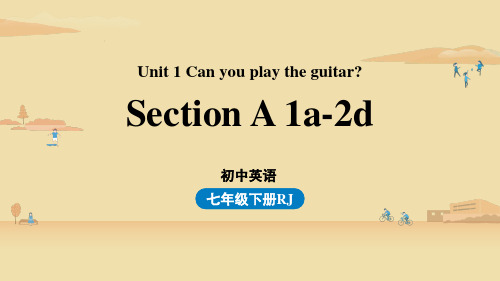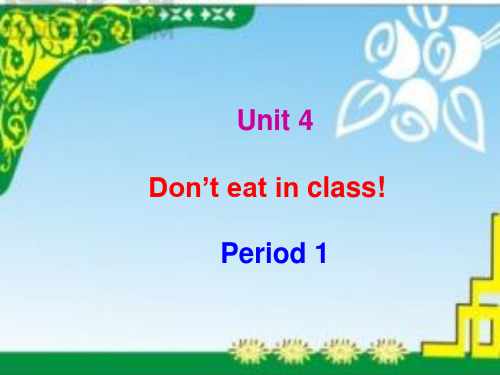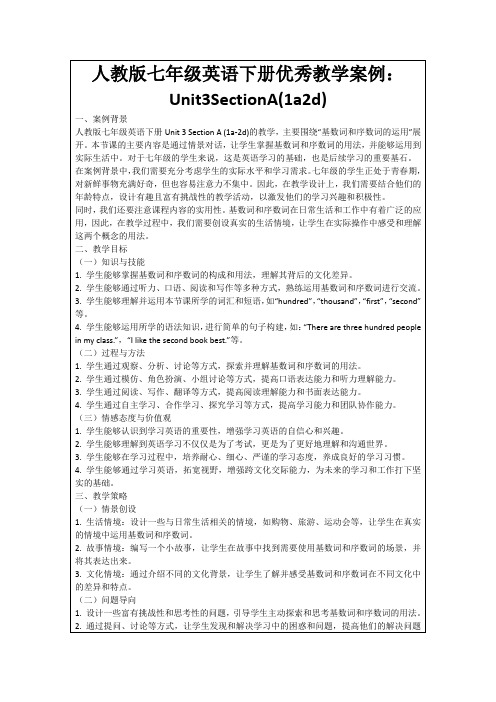初中英语人教版七年级下册Section 1a-2d
人教版七年级下册英语Unit1第1课时(SectionA 1a-2d)-最新

B: Oh, can you ˈsing?
A: ˈYes, I ˈcan. 2 A: Can you ˈswim?
want等词要重 读哦
B: ˈNo, I ˈcan’t.
3 A: I ˈwant to ˈjoin the ˈart ˈclub.
B: Can you ˈdraw? A: ˈYes, I ˈcan.
3. Sentences: ①Can you swim? —Yes, I can. /No, I can’t. ②What can you do? —I can dance./I can’t sing. ③What club do you want to join?—I want to join a/the
Unit 1 Can you play the guitar?
Section A 1a-2d
初中英语 七年级下册RJ
Learning goals
1. New words: guitar, chess, club, story, sing, swim, dance, draw, speak, join, tell 2. Expressions: play chess, speak English, be good at, play the guitar, join a club
play+球类运动/ 棋牌类名词
play soccer/football 踢足球 play volleyball 打排球
play Chinese chess下中国象棋
(2) play与乐器类名词连用,表示“演奏,弹奏, 吹奏”,此时名词前加定冠词the。
play the + 乐器 类名词
play the guitar 弹吉他 play the piano 弹钢琴 play the violin 拉小提琴 play the drums 敲鼓
人教版英语七年级下unit4SectionA1a--2d

We can’t_____
What else can’t we do at school?
•get up late. •play basketball in the classrooms. •talk to others in class. •ride a bike on campus •bring mobile phones to school. •break school things. …
Report
To make our school nicer, in our _____, we have to do following things: 1. Don’t_______________________________ 2. We can _____________________________ 3. We have to __________________________ But we don’t have to _____________________ we can’t _________________________, either. We should try to obey these rules and be a good student and make our school nicer!
Group work: Different places have different rules! Please make more rules to propose(倡议) students to help make our school nicer.
Class rules
dining hall rules
I think we should obey the school rules.
人教版七年级英语下册Unit10_Section_A(1a-2d)名师教案

Unit10 Section A(1a-2d)名师教案【教材版本与册数】新目标人教版七年级下册【单元名称】Unit 10 I’d like some noodles.【课时】Section A1a-2d(第1课时)【课型】Listening and speaking(听说课)附:教学活动设计步骤过程措施(教师活动与学生活动)目的持续性评价1预备与激活先期知识Step 1Greeting andLeading in(2mins)Show a picture and let the students answer the questionsbelow:1)Can you see three bowls?2)What are in them?3) Do you like noodles?4)Can you find the differences among the three bowls ofnoodles?通过图片引入话题,并通过提问引入课时单词学习。
部分学生能说出“noodles”,少部分学生能说出“beef noodles”。
2获取新知识Step 2Pre-listening(3mins)1. Teach the new words of food used in noodles.2. Look at the numbered list of ingredients. Read andrepeat.3. Ask students to match each word with the foods in 1a.4. Present the countable and uncountable nouns.5.List many words, and let the students discuss in groupsand tell us what kinds of nouns these words are.Ss practice in pairs like this:A: What kind of noodles would you like?B: I’d like beef and tomato noodles, please.A: What size bowl of noodles would you like?为1b的听力作铺垫准备和搭支架,这样通过直观图片和单词匹配的方式,能让学生更容易记住这些食物名称,也为后面的听说活动扫清了一部分词汇障碍。
人教版七下英语Unit12第1课时(SectionA 1a-2d)

Carol stayed at home, studied for the English test
Jack went to a farm, fed some cows
2a Listen and underline the words you hear. 1. _B__ I visited my (aunt/ grandma). 2. ___ I did (my homework/ sports). 3. ___ I studied for the (English/ math) test. 4. ___ I went to a (farm/ beach). 5. ___ I fed some (sheep/cows).
Well, on Saturday morning, I played badminton.
1a Match the activities with the pictures [a-f]. 1. did my homework _a_ 2. went to the cinema _d_ 3. went boating _e_ 4. camped by the lake_f_ 5. went to the beach _b_ 6. played badminton _c_
the afternoon, I went to the beach, and at night, I went to the cinema.
Bob: Cool. What about Sunday? Lucy: In the morning, I camped by the lake with my
What did you do last weekend, Lucy?
Well, on Saturday morning, I played badminton.
人教版七下英语Unit8第1课时(SectionA 1a-2d)

3. Sentences: ①—Is there a hospital near here? —Yes, there is.
②—Oh...where’s center Street? —It’s not too far from here.
/ˈhɒspɪtl/, /ˈhɑːspɪtl/ n.医院 S1: Is there a hospital? S2: Yes, there is. There is also a hotel.
/həʊˈtel/ n. 旅馆;酒店
/pəˈliːs/ n.警察 S1: Is there a police station ?
Language points 1. police station 警察局 (教材P43 1a)
police /pəˈliːs/ n. 警察 police是集合名词,表示复数意义,其前通常加定冠 词the,作主语时,谓语动词通常用复数形式。
➢ The police are looking for the lost child. 警察正在寻找 那个走失的孩子。
Listen again and check the answers. next to in front of between behind across from on
1. The police station is _b_e_tw__ee_n_ the restaurant and the hospital.
He wants to go to the bank. (2) Who is new in town?
人教版七年级英语下册优秀教学案例:Unit3SectionA(1a2d)

(一)知识与技能
1.学生能够掌握基数词和序数词的构成和用法,理解其背后的文化差异。
2.学生能够通过听力、口语、阅读和写作等多种方式,熟练运用基数词和序数词进行交流。
3.学生能够理解并运用本节课所学的词汇和短语,如“hundred”,“thousand”,“first”,“second”等。
3.引导学生反思自己的学习过程,发现自己的不足之处,并找到改进的方法。
(三)小组合作
1.将学生分成小组,鼓励他们相互合作、交流和分享,共同完成学习任务。
2.设计一些需要团队合作的活动,如角色扮演、小组讨论、共同完成任务等,让学生在合作中学习和发展。
3.鼓励学生发挥自己的特长和优势,相互学习和帮助,提高团队协作能力。
2.故事情境:编写一个小故事,让学生在故事中找到需要使用基数词和序数词的场景,并将其表达出来。
3.文化情境:通过介绍不同的文化背景,让学生了解并感受基数词和序数词在不同文化中的差异和特点。
(二)问题导向
1.设计一些富有挑战性和思考性的问题,引导学生主动探索和思考基数词和序数词的用法。
2.通过提问、讨论等方式,让学生发现和解决学习中的困惑和问题,提高他们的解决问题的能力。
1.教师通过讲解和示例,向学生介绍基数词和序数词的构成和基本用法。
2.教师通过展示一些例句和练习题,让学生理解和掌握基数词和序数词的用法。
3.教师通过讲解和示范,引导学生了解和区分基数词和序数词在不同的情境中的运用。
(三)学生小组讨论
1.教师将学生分成小组,并给出一些问题或任务,让学生在小组内进行讨论和合作。
人教版七年级英语下册优秀教学案例:Unit3SectionA(1a2d)
一、案例背景
人教版七年级英语下册Unit 3 Section A (1a-2d)的教学,主要围绕“基数词和序数词的运用”展开。本节课的主要内容是通过情景对话,让学生掌握基数词和序数词的用法,并能够运用到实际生活中。对于七年级的学生来说,这是英语学习的基础,也是后续学习的重要基石。
人教版七下英语Unit4第1课时(SectionA 1a-2d)

Activity
1. √___listen to music in the can can’t
classroom or hallways
2. √___listen to music in the can can’t
music room
3. √___listen to music outside can can’t
5. ___eat in the dining hall can
6. ___eat outside
can
7. ___wear a hat
can
8. ___fight
can
can’t
can’t
can’t can’t can’t can’t can’t can’t
Listen. Check (√) the activities Alan and Cindy talk about.
Don’t fight.
/faɪt/ n.& v. 打架;
战斗
Read the words and phrases before they are disappearing. bdlehiiasdmnafrhotoiulrneagunlinlniwlvhsen’lttetiagomy e
学生分两组,每一只蚂蚁代表 一组同学。一组的学生派代表 做违反校规的动作,另一组的 学生用英语表达他违反了什么 规则,说对了,点击小蚂蚁向 上爬一梯。两组学生轮流做动 作,看哪一组先爬上梯子。
2. Expressions: (be) on time, dining hall, listen to, have to 3. Sentences: ① Don’t fight./Don’t arrive late for class. ② We must be on time. ③ And we always have to wear the school uniform.
Unit1SectionA(1a-2d)单词记忆课件人教版英语七年级下册

谢谢您的观看
Thank you for watching
拼读法:英[spiːk] 美[spiːk]
Part 8
8.Join v.参加;加入
拆分:j(鸡的首拼)+o(鸡蛋的象形)+in (里面) 记忆:鸡拿着蛋在里面加入聚会
拼读法:英[dʒɔɪn] 美[dʒɔɪ
拆分:c(月亮的象形)+lub(路的拼音和边 的首拼) 记忆方法: 月亮看到路边有俱乐部。
拼读法:英[sɪŋ] 美[sɪŋ]
Part 3
3.Swim v&n. 游泳
拆分:sw(丝袜的缩拼)+i(蜡烛的谐音) +m(汉堡包) 记忆:去游泳的人穿着丝袜,还带着蜡烛 和汉堡
拼读法:英[swɪm] 美[swɪm]
Part 4
4.Draw v.画画
拆分:dr(敌人的缩拼)+a(一)+w(乌鸦 的首拼) 记忆:敌人在画一只乌鸦
拼读法:英[klʌb] 美[klʌb]
Part 10
10.Tell v.讲述;告诉
拆分:te(特工的拼音)+ll(榴莲的拼音) 记忆方法:特工讲述如何吃榴莲
拼读法:英[tel] 美[tel]
Part 11
11.Story n.故事
拆分:st(社团的缩拼)+o(鸡蛋的象形) +ry(日月的缩拼) 记忆方法:社团的人拿着鸡蛋讲日月的故事
section A (1a-2d) 单词记忆
Part 1
1.Guitar n.吉他
拆分法:gui(龟的拼音)+ta(踏的拼音) +r(小草象形) 记忆:乌龟边弹吉他边踏草。
- 1、下载文档前请自行甄别文档内容的完整性,平台不提供额外的编辑、内容补充、找答案等附加服务。
- 2、"仅部分预览"的文档,不可在线预览部分如存在完整性等问题,可反馈申请退款(可完整预览的文档不适用该条件!)。
- 3、如文档侵犯您的权益,请联系客服反馈,我们会尽快为您处理(人工客服工作时间:9:00-18:30)。
Unit 12 What did you do last weekend?
Period I Section A 1a-2d
一、教学目标:
1.知识与能力目标:
1)掌握以下单词:
camp, lake, beach, badminton, sheep, as, natural, butterfly, visitor, tired, stay, stay up late.
掌握以下句型:
①— Where did you do last weekend, Lucy?
— I went to summer camp.
②— How was your weekend?
— Pretty good, thanks.
③— I worked as a guide at the Natural History Museum.
④ How interesting!
2) 能了解以下语法:一般过去时
2.过程与方法目标:
通过学习单词及交际语言来掌握如何询问对方的周末的情况。
3.情感态度与价值观目标:
1. 帮助学生树立合作学习观点。
2. 讲述美好的周末,树立学生享受生活,热爱美好的大自然情感。
二、教学重难点
1. 教学重点:
1)重点词汇
2) 一般过去时的用法
2. 教学难点:
1) 一般过去时
2) 会用一般过去时,以及掌握一般过去时的标志性词语
三、教学用具:
白板、PPT
四、教学过程
Ⅰ. Warming-up
提问学生生词(只说汉语,让学生说英语以及拼写单词),询问学生“What did you do last weekend?”并让学生回答问题(提醒学生注意时态)。
Ⅱ.教学 1 a
1.先将六个词组翻译成汉语,并写出每个单词的动词原形。
2.让学生将词组与图片匹配起来。
3.Check the answers,并给学生时间记忆词组。
Ⅲ. Listening
1.明确听力重点
2.放第一遍录音,让学生写出答案。
3.放第二遍录音,按暂停键,一起核对答案。
Ⅳ. Pairwork
利用目标句型“What did you do last weekend?”让学生分组完成对话。
(每两个人一组),并提醒学生注意时态及动词的过去式的拼写。
Ⅴ. Listening
教学2a及2b
1.明确听力要求及听力重点;
2.放第一遍录音,完成填空;
3.放第二遍录音,学生自己核对答案;
4.放第三遍录音,按暂停键,让学生复述句子,核对答案。
Ⅵ. Pair work
Ask and answer in pairs.
Point to the example conversation. Ask two students to read the dialogue to the class.
Say, Now work with a partner. Student A, ask questions about what, who or where, Student B answers. Students work in pairs.
Ⅶ.Role-play the conversation.
1. Ask Ss to look at conversation in 2d. Then Ss read the dialogue by themselves
and find the answer to these questions:
① What did Lisa do on her weekend?
② What did Paul do on his weekend?
2. Ss work in pairs and role-play the conversations.
3. Have several pairs perform their conversations for the rest of the class. Homework:
1. Copy new words twice.
2. Write about what you did last weekend.
板书设计:
Section A 1a-2d
“work as+职业”做某工作
Living habits 生活习惯
Kind of 有点儿kinds of 种类
Stay up late 熬夜。
